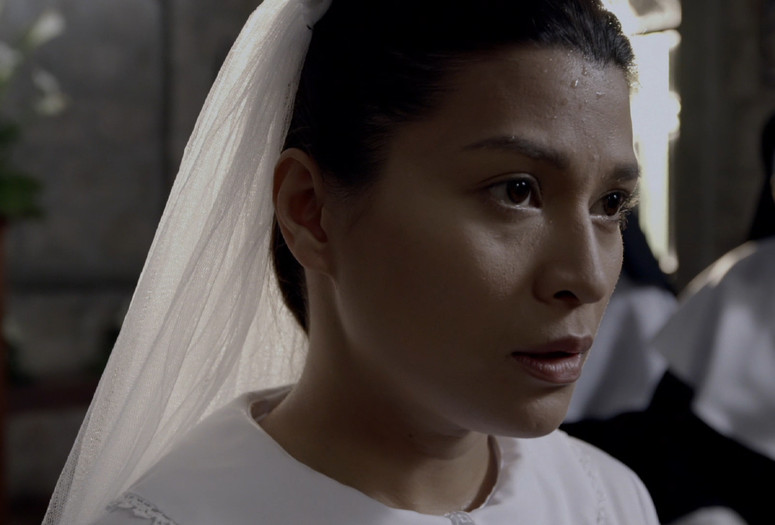




Cloisters, by their very nature, are cut off from the rest of the world. People of faith live there in order to dedicate themselves in service to God without being encumbered by the problems of the modern world. Yet, as governments and countries change, even the most secluded of us find themselves caught up in the events of history.
Isabel Sandoval’s film Apparition takes place in the Philippines, 1971, just before President Ferdinand Marcos devastates the country by putting it under Martial Law. We start as Sister Lourdes (Jodi Sta. Maria) makes her way to the convent, finding herself lost in a dense thicket of trees. Then, like in so many convent-based dramas, we are introduced to the many practices of this space, which functions as a universe unto itself, with its own codes and laws. They seem untouchable, solely dedicated to the Lord.
But Ferdinand Marcos has other ideas. The leader turned dictator of the Philippines is never seen but often heard, speaking on the radio in English as he calmly asserts power over the country, setting into course a series of events that will change the fabric of the nation forever, and even encroach upon this self-contained world.
It’s an interesting choice for Locarno’s Open Doors selection — finding the best cinema South East Asia and Mongolia has to offer— which has barely any new feature films this year, as it resembles, in both tone and content, the Argentinian drama of Maternal. Yet where the much stronger Maternal had an strongly-established aesthetic, using a lot of natural light to match, a lot of Apparition looks cheaply shot, with a strange blue filter used to dampen the striking look of the women’s habits.

Characters are often held at a remove, playing rigid roles (the stern Mother Superior, the Rebellious Friend) instead of being complex people in their own right. The central thesis point is finely drawn, especially by the way this feminine world is violently violated, but it cannot seem to amount to more than just academic criticism, further stressed by the Antonio Gramsci quote (“The old is dying and the new cannot be born. In this interregnum a great variety of morbid symptoms appear’) that opens the film. Additionally, the pivotal event of the movie is repeated from different angles, showing us how all the nuns are complicit in letting it happen. While sometimes this technique can work, little is revealed here that we didn’t already know, making it a somewhat superfluous filmmaking gesture.
With the Marcos Family still holding considerable sway in the Philippines, as shown in The Kingmaker, the message of Apparition — to speak up when power, both patriarchal and political, is being abused — rings as true as ever. But for a real understanding of how things can go wrong, that documentary, also available online, is a far more intriguing and urgent document.
Apparition plays as part of the Locarno Film Festival’s Open Doors segment, running online between August 5-15. Just click here in order to watch it.
















